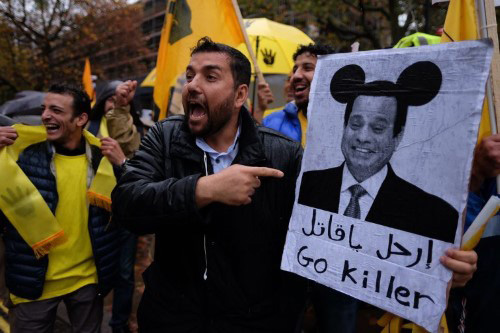Egyptian Police Weaponize Social Media Against Anti-Government Protesters
Emma Reed
Staff Writer
Across the streets of Cairo, demonstrators, study abroad students, and school children alike face detainment and torture by Egyptian security forces. Police instituted the harsh crackdown following an outbreak of anti-corruption protests four weeks ago, the first mass movement against President el-Sisi’s administration in years.
While police arrested many people at the protests themselves, they also detained a significant number at checkpoints, with officials searching phones for any “political” material. According to The Guardian, security forces add the names of those detained at checkpoints to a single charge sheet, a formal police record of a list of names of those arrested and their charges. The charges include aiding terrorist groups, spreading false information, misuse of social media, and participation in an unauthorized protest.
Since 2013, unauthorized gatherings of 10 or more people have not been permitted by the Egyptian government. Of the 3,120 people detained since the protests started on September 20th, 111 were children between the ages of 11 and 17. If all these charges were to be brought to court, it would be the single largest criminal prosecution of protesters
Well-known activist Alaa Abdel Fattah is among those arrested by the government in recent weeks. Rising to prominence in Egypt during the 2011 Alaa served five years behind bars for an unauthorized protest in 2014. Recently paroled, he was again arrested at a Cairo police station where he was required to remain for 12 hours every night as part of the conditions of his release, according to AlJazeera.
A tweet by Alaa’s sister and fellow human rights activist Mona Seif details that he was stripped of all clothing except for the underwear he was wearing during his arrest and tortured at the hands of security forces during his imprisonment. Like many other protesters and activists, Alaa faces charges of belonging to a terrorist organization and using social media to threaten national security.
Alaa is not the only voice of dissent who has been silenced by the police in recent weeks – his lawyer was also detained when he arrived at the detainment site to represent Alaa. Many human rights lawyers have gone into hiding fearing arrest, according to The Middle East Eye. One lawyer, who represents hundreds of political detainees and spoke on condition of anonymity, said that he no longer slept at home with his family to protect them. Amr Imam, a lawyer of the Arabic Network for Human Rights, told The Middle East Eye that recently terror over activism efforts has multiplied: “In the past years, being a human rights lawyer was like being an outlaw.”
The New York Times credits a military construction contractor named Mohammed Ali with originally the protests. Despite living in Spain, Ali utilized his previous ties to the el-Sisi administration for credibility and amassed a large social media by criticizing government corruption and calling for el-Sisi’s removal. Despite Facebook repeatedly removing his videos, Ali’s content still receives many views, which encourage more protests.
Given the increasing use of social media in organizing demonstrations, the Egyptian government now targets human rights lawyers, activists, and journalists with more tech-savvy approaches than simple checkpoints and random stops on the street. A recent report by Amnesty International describes how the government intends to deploy an “indiscriminate” mass-monitoring system of social media sites such as Facebook and Twitter. This system will look for 26 so-called violations, including mentioning walkouts, sit-ins, and other forms of protest. However, because the full list of violations has not been released yet, many are uncertain as to what the program will really look for.
The Committee to Protect Journalists says that since the protests began, many social media platforms and news outlet websites like Facebook Messenger, BBC, and Al Jazeera are harder to access. In addition to this, cyber threat investigation group Check Point Research found that there was a much more targeted attack against civil society in Egypt that has been going on since 2018. A “handpicked” list of journalists, activists, and members of non-governmental organizations were the victims of cyberattacks meant to spy on their accounts and monitor activity. Much of this was done through phishing pages, fake Gmail or Outlook websites, and even applications meant to track the physical location of a device and its communications. While nothing definitively points to the Egyptian government, Check Point Research’s investigation found that the “perpetrators are Arabic speakers, and well familiar with the Egyptian ecosystem.
The response from Western countries, if any, has been muted. The UK and the U.S. have yet to officially respond to the violence taking place and instead have taken a path of praising President el-Sisi. According to The Independent, British Prime Minister Boris Johnson lauded el-Sisi’s leadership at a bilateral meeting and did not address the violence or protests taking place. U.S. President Donald Trump also did not address the events taking place in Egypt, rather stating, “Where is my favorite dictator?” while waiting for a meeting with President el-Sisi at the Hotel du Palais during the G7 Summit, says The Independent.

